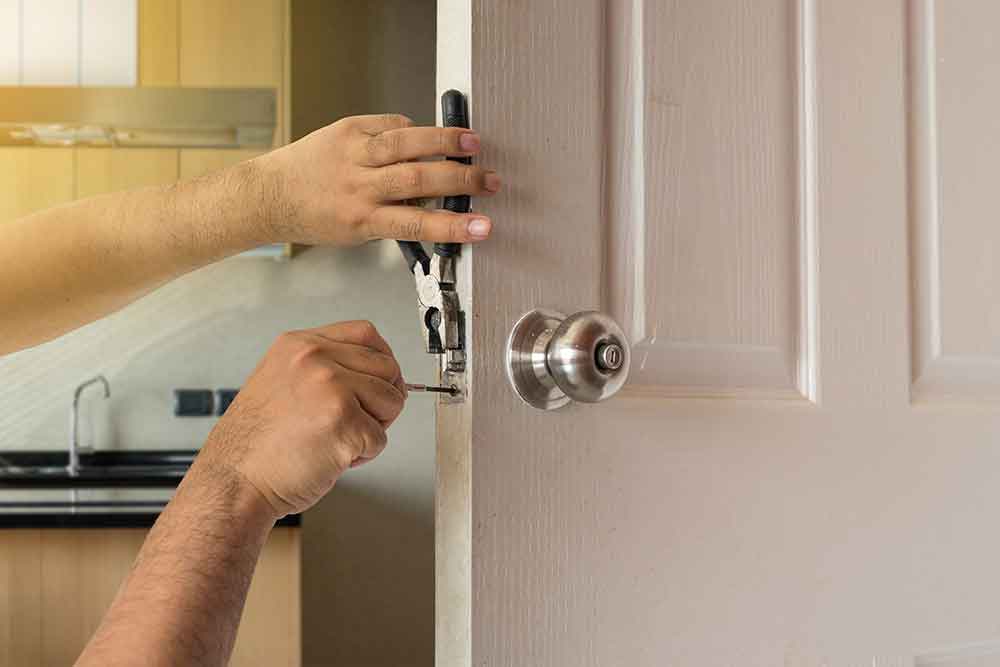
The Path to Becoming a Locksmith
Locksmiths are people who work with locks and safes.
Locksmiths often try to open locks without a key and without any damage.
Many can work with everything from basic locks to advanced computerized safes.
Some locksmiths also recommend and install security systems.
In order to successfully become a locksmith, you need to have excellent problem-solving skills, good spatial reasoning, a deep understanding of lock mechanics, great customer service skills, and good hand-eye coordination.
Interested in becoming a locksmith? Check out the locksmith training course offered by Stratford Career Institute!
A Locksmith’s Duties May Include
- Unlocking a customer’s car, business, or home
- Opening safes
- Rekeying locks
- Installing locks
- Repairing locks
- Duplicating locks
- Changing lock combinations
- Cutting keys
- Advising customers on security
- Inspecting locking mechanisms
- Providing service calls 24 hours a day
- Selling and installing safes
A locksmith may find employment as a freelance expert, with a locksmith business, or with a security company. Most locksmiths need to be available to work flexible hours.
In order to become a locksmith, you need to learn the locksmith skills, pass a background check, research getting licensed, and consider a certification.
How Long Does it Take to Become a Locksmith?
Like any other trade, becoming a locksmith requires both experience and education. To get started, most people take a locksmith training course which teaches them the skills they need for light commercial jobs.
Depending on the type of training you receive, becoming an entry-level locksmith takes anywhere from 6 months to 2 years. This is usually done through a combination of locksmith classes, apprenticeships, and certification courses.
Skills Needed for Locksmithing

Your success as a locksmith mostly depends on three factors: dexterity, problem-solving skills, and customer service.
Since locksmithing involves working with small parts for several hours per day, you need to be dexterous enough to assemble and disassemble locks.
In addition, you need to understand the mechanics of locks well enough to repair, install, or troubleshoot on-site for customers.
Finally, since locksmiths work with a variety of people from different backgrounds, you must have the ability to professionally communicate with customers.
Locksmith Education
Becoming a locksmith often requires a mixture of hands-on training and in classroom learning such as Stratford Career Institute’s Locksmith Training Course.
Our course covers locksmithing theories, best practices, and industry information. This includes the basics of key-cutting, master-keying, automotive lock servicing, lock type, and running a locksmithing business.
Hands-on training is when someone actually shows you in-person how to become a locksmith and what it is like to work as a locksmith. You can get this training by becoming an apprentice under an experienced locksmith.
Some states may require you to be an apprentice under a licensed locksmith for a specific amount of time.
For example, to be licensed in New Jersey, you must have three years of practical experience as a locksmith for a minimum of 5,040 working hours.
As an alternative, you can complete an approved two-year apprenticeship instead. You also need to take and pass New Jersey’s locksmithing examination.
Background Check
Because locksmiths have access to personal information and property, many states require that all locksmiths pass background checks to show that they do not have a criminal history.
Locksmith License
Some states and municipalities require that locksmiths are licensed or go through specific training courses.
Some states and cities require that you spend a minimum amount of time as an apprentice locksmith under a licensed locksmith while others may require you to pass a test before getting your license.
You should research your area to see what your state and local requirements are.
As of 2021, there are 15 states which require a license to be a locksmith:
- Alabama,
- California,
- Connecticut,
- Illinois,
- Louisiana,
- Maryland,
- Nebraska,
- Nevada,
- New Jersey,
- North Carolina,
- Oklahoma,
- Oregon,
- Tennessee,
- Texas, and
- Virginia.
In addition, there are a few cities and counties which require licensing, including New York City, Nassau County in Long Island, and both Hillsborough and Miami-Dade counties in Florida.
Locksmith Certification
Additionally, you can obtain a voluntary certification. Having a certification can increase your clients trust in your abilities and increase your credibility.
Some businesses or employers may prefer locksmiths who have a recognized certification.
The Associated Locksmiths of America offers certifications designating you as a ALOA Fundamental Locksmith (AFL), Certified Automotive Locksmiths (CAL), Certified Registered Locksmith (CRL), Certified Professional Locksmith (CPL), or Certified Master Locksmith (CML).
These certifications have different requirements but generally include a test of your knowledge in specific areas related to being a locksmith. Each level of certification includes a mandatory section with 10 categories and 26 elective sections.
To pass the CRL exam, you must receive a passing grade of 70% or more in the mandatory section and two elective sections.
To receive a CPL, which is considered an intermediate certification, you must pass 12 additional elective sections with a score of 70% or higher.
Finally, to get the highest certification of CML, you must receive a score of 70% or higher in another nine elective sections.
If you want to become specialized in a certain area of locksmithing, such as automotive locks, you may need additional training or certifications.
For example, the Safe and Vault Technicians Association (SAVTA) offers two certifications for locksmiths who want to work with high-security safes.
The first designation is the Certified Professional Safe Technician (CPS), for which you must demonstrate basic proficiency in safe and vault installation and repair.
The second designation, Certified Master Safe Technician, is the highest certification offered.
Continuing Education
Although continued education in locksmithing isn’t required after certification, it helps you keep up with industry trends. Locksmith associations and schools offer plenty of opportunities to obtain higher-level certifications or attend advanced training courses.
Interested in a Career as a Locksmith?
Stratford Career Institute’s locksmith training course is a great way to learn more about locksmithing basics. While this introductory course does not replace the need for on-the-job training, it is a good way to get acquainted with the profession.
Plus, with its thorough review of the various duties of a locksmith, it can help you hone in on what your interests in locksmithing are.
Train to Be a Locksmith!

If you’re thinking about a career as a locksmith, check out Stratford’s distance learning courses!

